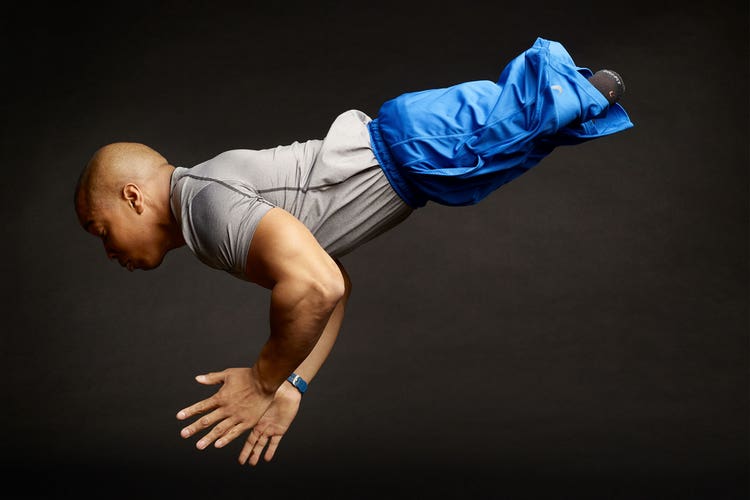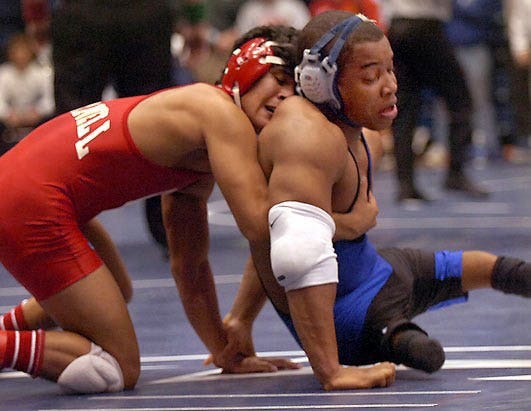Rohan Murphy Has No Legs, and No Excuses Holding Him Back

Rohan Murphy isn’t afraid to fail—legs or no legs.
Born with a very severe defect that led to a double leg amputation at age 4, the social media influencer and motivational speaker knows better than anyone what it means to have the odds stacked against him. Murphy was the only person in his high school of 1,200 students in a wheel chair—not to mention the only African-American in his graduating class. But his disability doesn’t keep him from taking chances and seizing opportunities.
“I tell young people I speak to, ‘Don’t be afraid of failing.’ To me, losing at something in life doesn’t make you a loser. Failing at something in life doesn’t make you a failure,” Murphy says. “What makes you those things is being a quitter and giving up on something—not having that courage to take that initial risk to reach greatness.”
A lover of sports, Murphy’s options were limited. In eighth grade, his physical education teacher, Ron Croteau, encouraged him to go out for the wrestling team. “At first, I thought he was crazy. But he didn’t give up on me,” Murphy says, laughing. “Finally, in the eighth grade, I found a sport that I could play.” Murphy promised his teacher that when he got to high school, he would go out for the wrestling team.
His mom, however, was worried. “She said, ‘Rohan, you’re going to be out there wrestling kids with legs. You’re going to be at a huge disadvantage. Aren’t you worried? Aren’t you afraid you’re going to lose?’ I told her I wasn’t afraid to fail,” Murphy recalls.
Murphy made the team, but he didn’t know what to expect from his teammates the first time he crawled onto the wrestling mat, sans prosthetic legs. Something amazing happened, Murphy says. No one bullied him or made fun of him. Instead, every single one of his teammates shook his hand and welcomed him to the team.
“And for the very first time in my life, outside of my own family, I felt acceptance and I felt that I actually belonged somewhere,” Murphy says. “I tell people that story all the time, too, because I think in life, we all need to try to be a little bit more inclusive rather than exclusive. That’s not just an anti-bullying stance. To me, being inclusive, that’s a human stance.”
Choose to be great

Murphy’s first wrestling season went anything but well. He finished with two wins and 13 losses. “Most people, especially young people, they might quit. They might give up, but that’s not me,” he says.
Murphy knew that if he just kept wresting and training, he could someday be great. So he dedicated himself to the sport. The next year, he made the varsity team as a sophomore and finished the season with 25 wins and six losses. But he still wasn’t satisfied. So he signed up for a summer wrestling camp in Minnesota, where he was coached by WWE and UFC champion Brock Lesnar.
“He had me do a crazy workout where I had to do a handstand across a football field, and then once I got down to one end zone, I had to do a pyramid of 10 push-ups,” Murphy recalls. On the very last day of camp, each wrestler had to run a marathon—their choice of five, 10 or 15 miles. Murphy went 17 miles. (He got lost on the way back.)
“I tell people all the time that in life, you’ll have choices. Just like all those kids at that camp had a choice with the marathon, you have a choice and that’s to be either average, good or great at whatever you all do in life,” Murphy says. “Choose to be great, choose to get the most out of life, and always choose to be your personal best because as we all know, you get one life. So you might as well make it count, with or without legs.”
Murphy’s second lifelong goal (after finding a sport he could play) was to go to a big university and graduate. He was accepted into his first-choice school, Penn State, and decided to try out for the wrestling team (a NCAA Division I program).
“I found the head coach of Penn State wrestling’s email and I sent him a message. And in that email, I told coach everything about myself—but I forgot to mention that I didn’t have legs,” Murphy says, laughing.
The coach invited Murphy to come by his office and try out. When his coach opened the door, he offered Murphy a managerial role. But Murphy was determined to wrestle.
“He said, ‘If you don’t have legs and you’re in a wheelchair, how will you wrestle?’ I told him, ‘It’s hard to explain, but I can show you.’ He said, ‘All right.’ So I took him down right in his office,” Murphy says.
No excuses
Murphy knows that success has nothing to do with ability, and he refuses to use his disability as an excuse. “My life motto is very simple, very straightforward: no excuses. You want something out of life? Go get it. Go earn it. Go achieve it,” he says.
Today, Murphy travels the country speaking to young people and adults about what it means to follow your dreams, despite the risk of failure. As he walks across on the stage on his hands, Murphy quotes Dr. Martin Luther King Jr.: “If you can’t fly then run, if you can’t run then walk, if you can’t walk then crawl, but whatever you do you have to keep moving forward.”
Yet no matter how much of his story he shares, Murphy knows that he can only inspire. He can’t give anyone the intrinsic motivation needed to succeed; he can’t do the work for them. It’s up to them to find their purpose in life and pursue it at any cost.
“I usually tell young people that by being born disabled, not having legs, that I was dealt a bad hand in life. But just because you’re dealt a bad hand in life doesn’t mean you have to play it,” Murphy says. “Every single person in this world has to overcome something. I’ve overcome this, and if I can be successful even without legs, why can’t every young person do the same? What’s holding them back? What’s stopping them? At the end of the day, what’s going to be their excuse?”
Photos: Rick Wenner; Courtesy Rohan Murphy
